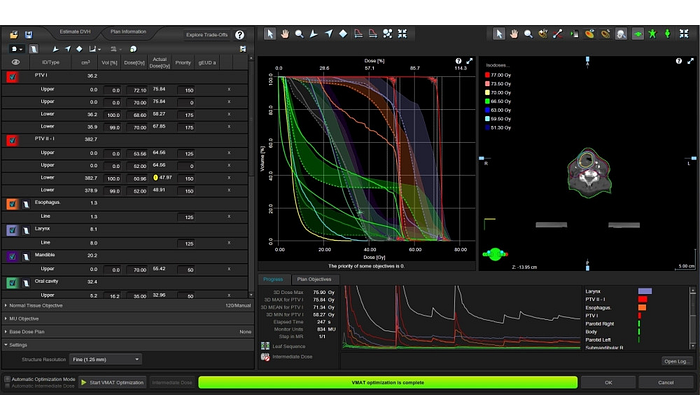Cone Health Cancer Center in Greensboro, North Carolina is combining the power of scripting for the Eclipse™ treatment planning system with RapidPlan™ knowledge-based planning. Medical physicist Lane Hayes recently co-authored a paper in the Journal of Applied Clinical Medical Physics, detailing some of the results.*
“Our team already had a strong scripting and development background, so when we upgraded to Eclipse 15.5, we went a few steps further,” Hayes explains. “We combined scripting in Eclipse with RapidPlan and generated a plan that met all department conventions. Then we applied an appropriate dose volume histogram estimations model using RapidPlan and arrived at a fully optimized and calculated treatment plan that was really far along from where we started.”
This combined approach allows the team to implement RapidPlan quickly and simply tune the output if deficiencies are detected. If it’s not meeting certain criteria, the team only does an intermediate optimization iteration and planning is complete.
 RapidPlan Optimiser screen (Varian image)
RapidPlan Optimiser screen (Varian image)
With about 130 patients a day receiving treatment at the cancer center, Hayes and his team intend to use the same combined planning process for lung and head and neck.
“We started testing this method at the beginning of 2019 and have just finished our blinded review,” Hayes adds. “We estimated that the total active planning time for manually developed plans was 1.5 to 2 hours per plan. RapidPlan alone brought that down to about 20 minutes total planning time. We’ve seen that when you put these techniques together, it not only generates significant time savings but adds real value to the plan.”
Discover more about the machine learning features in RapidPlan knowledge-based planning.
*Amaloo C, Hayes L, Manning M et al. Can automated treatment plans gain traction in the clinic? J Appl Clin Med Phys 2019; 20:8:29–35
The information captured herein represents the genuine experience of the attributed individuals and may not necessarily represent the views of Varian or the above referenced institution. Individuals were not compensated for their participation. Radiation treatment may not be appropriate for all cancers. Individual results may vary.